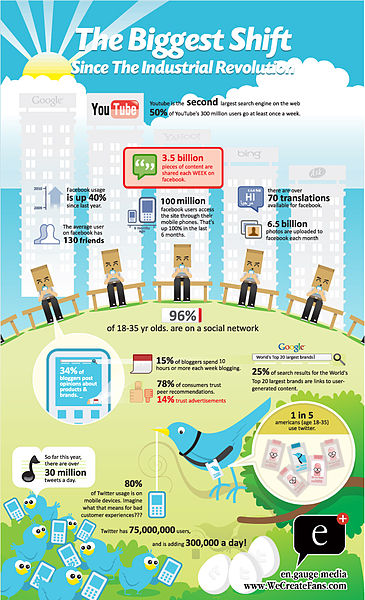Social Media Diplomacy Is about Innovation
Diplomacy is evolving, rapidly adapting to a world in which real time communication is faster than ever and the “rules of engagement” are not limited only to foreign policy and military strategy, but also to social media and public diplomacy.
June 27, 2013 -
Andreas Sandre
-
Articles and Commentary

365px-Social_media_revolution.jpg
It is a different kind of engagement, a veritable framework to provide the conditions necessary for ambassadors and diplomats to open and nurture a true dialogue with their publics, both at home and abroad. This thick layer that separated the diplomatic elite from the citizens has now gone, and has been replaced by multiple open channels that the diplomatic community is still exploring to different levels of success and sophistication.
These channels, including Twitter, Facebook, and other social media platforms, have changed the way we see the world, as well as the way foreign policy practitioners – at both the political and diplomatic levels – talk to governments, interact with civil society, network with businesses, relate to non-governmental entities and foundations.
The tradition behind foreign policy strategies and priorities is still important and stands solid as a pillar of how to conduct bilateral and multilateral diplomacy. It is now a matter of empowering the diplomatic craft with innovation and technology, and learning – by trying, mostly – to integrate digital tools into the everyday lives of diplomats, ambassadors and foreign ministers. It is key for all of us to understand the process behind what we call digital diplomacy. It is not about technology per se: diplomats are not computer engineers.
Technology, whether you master it or not, is a tool, not the goal. It is what we use to communicate, implement foreign policy directives, and actuate a diplomatic agenda in a way that does not exclude traditional methods, but rather it enhances them. You see this everyday, with ambassadors turning to Twitter and Facebook to better their reach. They are embracing technology to various degrees, but certainly with a clear goal: to open dialogue and be engaging.
That said, technology needs to be understood in order to be applied coherently and with success. Once a motive of frustration, technology is becoming diplomacy’s best friend, and more and more ambassadors around the world are now well-versed in tech jargon.
At the Embassy of Italy in Washington DC, the process of integration between traditional activity and social media presence has brought us to the creation of the embassy’s Social Media Hub (www.twiplomacy.it/usa). In one single page, formatted to be accessible online, including by tablets and mobile devices, the user has an overall picture of what the embassy does in terms of digital diplomacy. It is a way to make it easier for the public to find us online and engage with us at all levels on topics ranging from foreign policy to public diplomacy, business, art, and more.
“The idea of a Social Media Hub is as simple as it is innovative, making it possible for us to spotlight our press and social media activities on a single page,” the Italian Ambassador to the US, Claudio Bisogniero, said in a recent interview. “What is most interesting is how the page continues to circulate on social networks, with over 900 ‘shares’ to date, drawing more and more virtual visitors,” he added.
While I don’t believe new technologies and social media have had a strong impact on the daily life of the embassy – as traditional diplomacy has not disappeared, but rather improved – it is safe to say that diplomats have been forced towards a different way of engaging foreign publics. And the Hub is indeed an example as it has been drawing us closer to the end user, allowing us a more personal approach at all levels.
In this context, diplomacy – and public diplomacy in particular – has changed and is now geared more towards an organic way of interacting online, reducing political discourse to a minimum. The key messages are still present, but the focus is now to build a dialogue.
In order to achieve this goal, it is important to tune the message in a way that it is organic, bold, and engaging. If you look at how diplomats around the world communicate on social media platforms, the three key ingredients to success are: being organic, and thus establishing a natural dialogue with your public, which helps nurture the conversation and reach a larger audience; being bold, while not always necessary, generates additional interest and encourages debate. And while organic communication and boldness are becoming more frequent in how diplomats interact online, the engagement side of this triptych equation comes at various levels. Being engaging is not easy to achieve and unfortunately there are no set recipes for success. It is often a try-and-fail process and as such it requires experimentation.
As social media is here to stay, being experimental and thinking outside of the box is certainly not a bad thing. I believe it is the key to innovation in foreign policy.
Andreas Sandre is a Press and Public Affairs Officer at the Embassy of Italy in Washington DC. He is the author of Twitter for Diplomats (February 2013) and has contributed articles on foreign policy and digital diplomacy to numerous specialised publications, including the Huffington Post, DiploFoundation, the Global Policy Journal, and BigThink. The views expressed in this article are the author’s only and do not necessarily reflect those of the Embassy of Italy. Find Andreas Sandre on Twitter @andreas212nyc


































